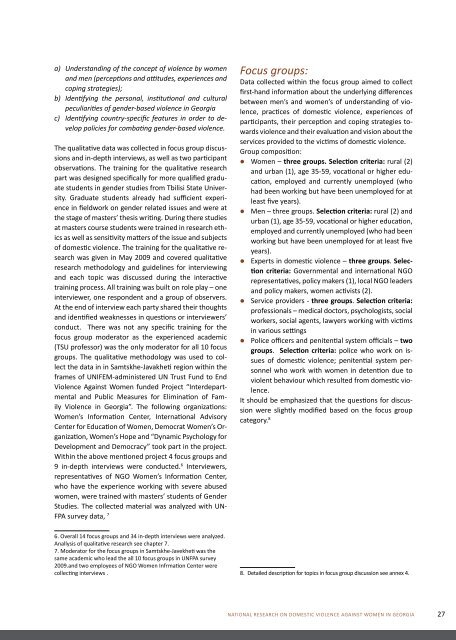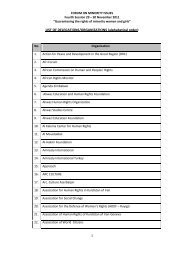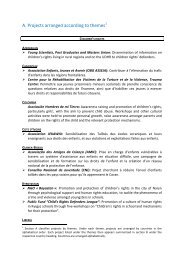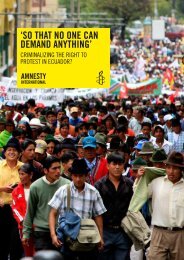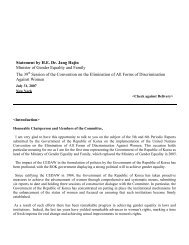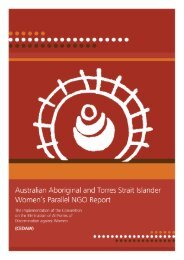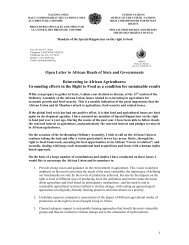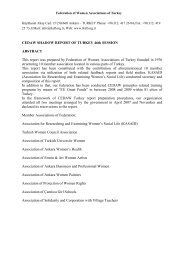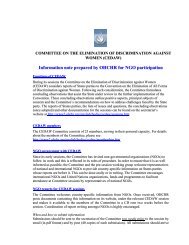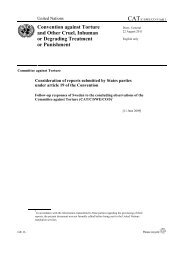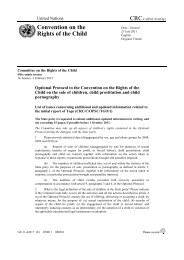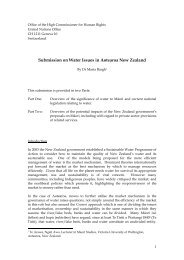National Research on Domestic Violence Against Women in
National Research on Domestic Violence Against Women in
National Research on Domestic Violence Against Women in
Create successful ePaper yourself
Turn your PDF publications into a flip-book with our unique Google optimized e-Paper software.
a) Understand<strong>in</strong>g of the c<strong>on</strong>cept of violence by womenand men (percepti<strong>on</strong>s and attitudes, experiences andcop<strong>in</strong>g strategies);b) Identify<strong>in</strong>g the pers<strong>on</strong>al, <strong>in</strong>stituti<strong>on</strong>al and culturalpeculiarities of gender-based violence <strong>in</strong> Georgiac) Identify<strong>in</strong>g country-specific features <strong>in</strong> order to developpolicies for combat<strong>in</strong>g gender-based violence.The qualitative data was collected <strong>in</strong> focus group discussi<strong>on</strong>sand <strong>in</strong>-depth <strong>in</strong>terviews, as well as two participantobservati<strong>on</strong>s. The tra<strong>in</strong><strong>in</strong>g for the qualitative researchpart was designed specifically for more qualified graduatestudents <strong>in</strong> gender studies from Tbilisi State University.Graduate students already had sufficient experience<strong>in</strong> fieldwork <strong>on</strong> gender related issues and were atthe stage of masters’ thesis writ<strong>in</strong>g. Dur<strong>in</strong>g there studiesat masters course students were tra<strong>in</strong>ed <strong>in</strong> research ethicsas well as sensitivity matters of the issue and subjectsof domestic violence. The tra<strong>in</strong><strong>in</strong>g for the qualitative researchwas given <strong>in</strong> May 2009 and covered qualitativeresearch methodology and guidel<strong>in</strong>es for <strong>in</strong>terview<strong>in</strong>gand each topic was discussed dur<strong>in</strong>g the <strong>in</strong>teractivetra<strong>in</strong><strong>in</strong>g process. All tra<strong>in</strong><strong>in</strong>g was built <strong>on</strong> role play – <strong>on</strong>e<strong>in</strong>terviewer, <strong>on</strong>e resp<strong>on</strong>dent and a group of observers.At the end of <strong>in</strong>terview each party shared their thoughtsand identified weaknesses <strong>in</strong> questi<strong>on</strong>s or <strong>in</strong>terviewers’c<strong>on</strong>duct. There was not any specific tra<strong>in</strong><strong>in</strong>g for thefocus group moderator as the experienced academic(TSU professor) was the <strong>on</strong>ly moderator for all 10 focusgroups. The qualitative methodology was used to collectthe data <strong>in</strong> <strong>in</strong> Samtskhe-Javakheti regi<strong>on</strong> with<strong>in</strong> theframes of UNIFEM-adm<strong>in</strong>istered UN Trust Fund to End<strong>Violence</strong> <strong>Aga<strong>in</strong>st</strong> <strong>Women</strong> funded Project “Interdepartmentaland Public Measures for Elim<strong>in</strong>ati<strong>on</strong> of Family<strong>Violence</strong> <strong>in</strong> Georgia”. The follow<strong>in</strong>g organizati<strong>on</strong>s:<strong>Women</strong>’s Informati<strong>on</strong> Center, Internati<strong>on</strong>al AdvisoryCenter for Educati<strong>on</strong> of <strong>Women</strong>, Democrat <strong>Women</strong>’s Organizati<strong>on</strong>,<strong>Women</strong>’s Hope and “Dynamic Psychology forDevelopment and Democracy” took part <strong>in</strong> the project.With<strong>in</strong> the above menti<strong>on</strong>ed project 4 focus groups and9 <strong>in</strong>-depth <strong>in</strong>terviews were c<strong>on</strong>ducted. 6 Interviewers,representatives of NGO <strong>Women</strong>’s Informati<strong>on</strong> Center,who have the experience work<strong>in</strong>g with severe abusedwomen, were tra<strong>in</strong>ed with masters’ students of GenderStudies. The collected material was analyzed with UN-FPA survey data, 7Focus groups:Data collected with<strong>in</strong> the focus group aimed to collectfirst-hand <strong>in</strong>formati<strong>on</strong> about the underly<strong>in</strong>g differencesbetween men’s and women’s of understand<strong>in</strong>g of violence,practices of domestic violence, experiences ofparticipants, their percepti<strong>on</strong> and cop<strong>in</strong>g strategies towardsviolence and their evaluati<strong>on</strong> and visi<strong>on</strong> about theservices provided to the victims of domestic violence.Group compositi<strong>on</strong>:• <strong>Women</strong> – three groups. Selecti<strong>on</strong> criteria: rural (2)and urban (1), age 35-59, vocati<strong>on</strong>al or higher educati<strong>on</strong>,employed and currently unemployed (whohad been work<strong>in</strong>g but have been unemployed for atleast five years).• Men – three groups. Selecti<strong>on</strong> criteria: rural (2) andurban (1), age 35-59, vocati<strong>on</strong>al or higher educati<strong>on</strong>,employed and currently unemployed (who had beenwork<strong>in</strong>g but have been unemployed for at least fiveyears).• Experts <strong>in</strong> domestic violence – three groups. Selecti<strong>on</strong>criteria: Governmental and <strong>in</strong>ternati<strong>on</strong>al NGOrepresentatives, policy makers (1), local NGO leadersand policy makers, women activists (2).• Service providers - three groups. Selecti<strong>on</strong> criteria:professi<strong>on</strong>als – medical doctors, psychologists, socialworkers, social agents, lawyers work<strong>in</strong>g with victims<strong>in</strong> various sett<strong>in</strong>gs• Police officers and penitential system officials – twogroups. Selecti<strong>on</strong> criteria: police who work <strong>on</strong> issuesof domestic violence; penitential system pers<strong>on</strong>nelwho work with women <strong>in</strong> detenti<strong>on</strong> due toviolent behaviour which resulted from domestic violence.It should be emphasized that the questi<strong>on</strong>s for discussi<strong>on</strong>were slightly modified based <strong>on</strong> the focus groupcategory. 86. Overall 14 focus groups and 34 <strong>in</strong>-depth <strong>in</strong>terviews were analyzed.Anallysis of qualitative research see chapter 7.7. Moderator for the focus groups <strong>in</strong> Samtskhe-Javekheti was thesame academic who lead the all 10 focus groups <strong>in</strong> UNFPA survey2009.and two employees of NGO <strong>Women</strong> Infrmati<strong>on</strong> Center werecollect<strong>in</strong>g <strong>in</strong>terviews .8. Detailed descripti<strong>on</strong> for topics <strong>in</strong> focus group discussi<strong>on</strong> see annex 4.NATIONAL RESEARCH ON DOMESTIC VIOLENCE AGAINST WOMEN IN GEORGIA27


